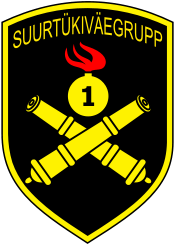Artillery Battalion (Estonia)
| Artillery Battalion | |
|---|---|
| Suurtükiväepataljon | |
|
Insignia | |
| Active |
1918–1940 1998– |
| Country |
|
| Branch | Estonian Defence Forces |
| Type | Artillery |
| Role | Fire support |
| Size | Battalion |
| Garrison/HQ | Tapa Army Base |
| Anniversaries |
16 January 20 March |
| Equipment | 122mm D-30A • 155mm FH-70 |
| Engagements | Estonian War of Independence |
| Commanders | |
| Colonel Lieutenant | Kaarel Mäesalu |
The Artillery Battalion (Estonian: Suurtükiväepataljon), formerly the Artillery Group (Suurtükiväegrupp) is the artillery force of the Estonian Defence Forces, which has a supportive military formation role among the Estonian Ground Forces. The main task of this formation is to provide artillery support for the infantry operating on the battlefield.
Subunits
![]() Artillery Battalion
Artillery Battalion
- Staff
- Artillery school
- 2 batteries
History
The Artillery Battalion was created on 16 January 1918. On 21 November 1918 the Estonian Minister of War named the captain Hugo Kauler to the commander of the 1st Artillery Battalion. The unit fought during the Estonian War of Independence mainly on the Narva, Tartu and Viljandi fronts. The unit also participated in the Landeswehr war in Northern Latvia (Cēsis). Most of the combat firings were carried out by direct firing from the positions.[1]
Present day
This battalion is dislocated in Tapa Army Base, Tapa. It trains conscripts for wartime artillery units. This battalion has good opportunities for live fire because of large Central Training Area. What is important, 60–120 mm mortars belong to infantry battalions, not artillery, in the Estonian armed forces.
Equipment
The Artillery Battalion is currently armed with the Europe's first multi-national artillery program field howitzer FH-70s.[2] This gun has largest caliber in Baltic countries. Other guns are from Finnish Defence Forces.
Future development
On 19 February 2008 Finland offered Estonia a large number of field howitzers along with ammunition and spare parts at a symbolic price. The deal included 42 122 mm H63 field howitzers. The deal was accepted[3][4]
References
- ↑ http://www.mil.ee/?menu=maavagi&sisu=suurtukk History of the Artillery Group
- ↑ http://en.wikipedia.org/wiki/FH-70#Design FH-70 design
- ↑ http://www.epl.ee/?uudised=419157 Soome pakub soodsaid suurtükke
- ↑ http://www.delfi.ee/news/paevauudised/eesti/article.php?id=21331721
| ||||||||||||||||||||||||||||||||||||||||||||||||||||||||||||||||||||||||||||||||||||||||||||||||||||||||||||||||||||||||||||||||||||||||||||||||||
